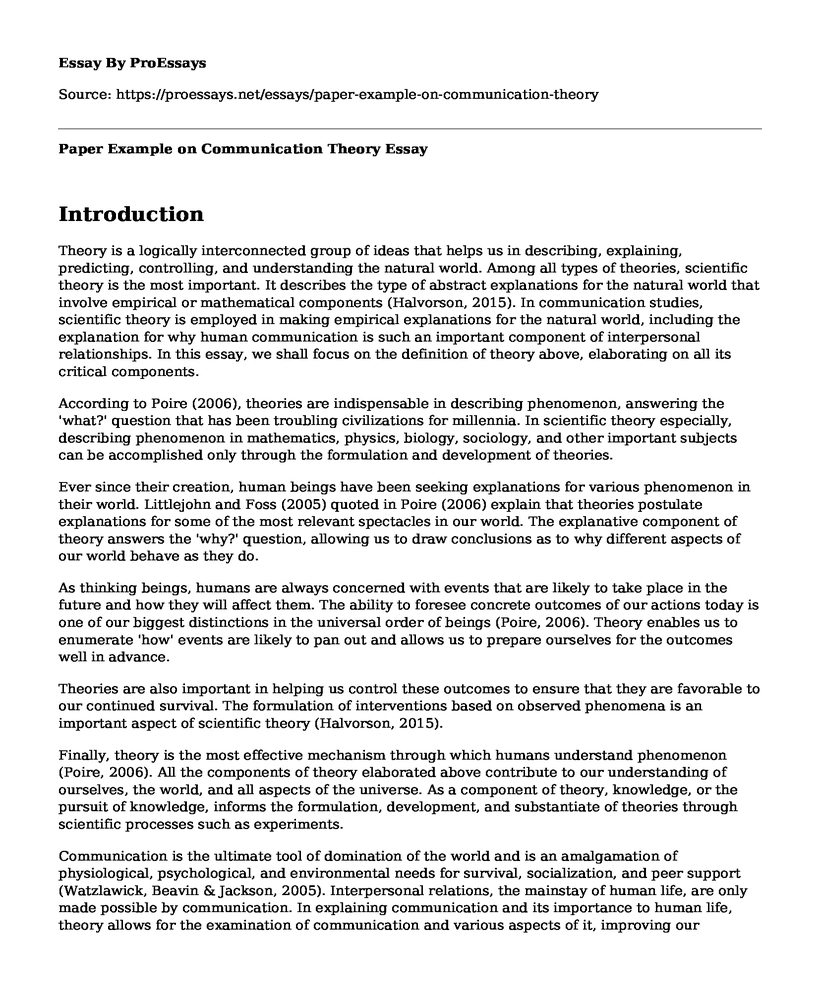Introduction
Theory is a logically interconnected group of ideas that helps us in describing, explaining, predicting, controlling, and understanding the natural world. Among all types of theories, scientific theory is the most important. It describes the type of abstract explanations for the natural world that involve empirical or mathematical components (Halvorson, 2015). In communication studies, scientific theory is employed in making empirical explanations for the natural world, including the explanation for why human communication is such an important component of interpersonal relationships. In this essay, we shall focus on the definition of theory above, elaborating on all its critical components.
According to Poire (2006), theories are indispensable in describing phenomenon, answering the 'what?' question that has been troubling civilizations for millennia. In scientific theory especially, describing phenomenon in mathematics, physics, biology, sociology, and other important subjects can be accomplished only through the formulation and development of theories.
Ever since their creation, human beings have been seeking explanations for various phenomenon in their world. Littlejohn and Foss (2005) quoted in Poire (2006) explain that theories postulate explanations for some of the most relevant spectacles in our world. The explanative component of theory answers the 'why?' question, allowing us to draw conclusions as to why different aspects of our world behave as they do.
As thinking beings, humans are always concerned with events that are likely to take place in the future and how they will affect them. The ability to foresee concrete outcomes of our actions today is one of our biggest distinctions in the universal order of beings (Poire, 2006). Theory enables us to enumerate 'how' events are likely to pan out and allows us to prepare ourselves for the outcomes well in advance.
Theories are also important in helping us control these outcomes to ensure that they are favorable to our continued survival. The formulation of interventions based on observed phenomena is an important aspect of scientific theory (Halvorson, 2015).
Finally, theory is the most effective mechanism through which humans understand phenomenon (Poire, 2006). All the components of theory elaborated above contribute to our understanding of ourselves, the world, and all aspects of the universe. As a component of theory, knowledge, or the pursuit of knowledge, informs the formulation, development, and substantiate of theories through scientific processes such as experiments.
Communication is the ultimate tool of domination of the world and is an amalgamation of physiological, psychological, and environmental needs for survival, socialization, and peer support (Watzlawick, Beavin & Jackson, 2005). Interpersonal relations, the mainstay of human life, are only made possible by communication. In explaining communication and its importance to human life, theory allows for the examination of communication and various aspects of it, improving our cognition on communication and thus the effectiveness of our communications with each other.
Theoretical explanations and evaluations of communication gives rise to competent explanations of our cultural heritage and also facilitates subjects such as anthropology in tracing human evolution through the ages by assessing language. Theoretical study of communication and language enables us to understand human relations and improves the quality of our interpersonal relationships. According to Watzlawick et al. (2005), the evaluation of interconnected group of ideas in communication also helps us to understand visual, auditory, and kinesthetic modalities of communication.
Conclusion
In conclusion, theory is the baseline of human understanding of their environment, and scientific theory is especially important in granting us the opportunity to evaluate these linkages. Human communication is the most important aspect of our lives, powering all our interactions and pursuits, including the quest for understanding theory and aspects of human communication.
References
Watzlawick, P., Beavin, J. H., & Jackson, D. D. (2005). Chapter 2: Principles of human communication. Burlington: Jones and Barlett Publishers, 23-47
Poire, B. A. (2006). Theoretical approaches to understanding communication in the family. California: California Lutheran University Press
Halvorson, H. (2015). Scientific theories. The Oxford Handbook of Philosophy of Science. Oxford: Oxford University Press
Cite this page
Paper Example on Communication Theory. (2022, Jun 05). Retrieved from https://proessays.net/essays/paper-example-on-communication-theory
If you are the original author of this essay and no longer wish to have it published on the ProEssays website, please click below to request its removal:
- Parental Involvement in a Child's Education: Research Proposal
- Perceptual Distortion Essay
- Essay Sample on The Future of Quebec Society in North America
- Technology Impact on Parent Child Relationship Essay Example
- What is Trust? - Essay Sample
- Essay Sample on Effective Communication: Essential Tool for Optimal Management
- Essay Example on America's Indigenous Society: The Maya Civilization







